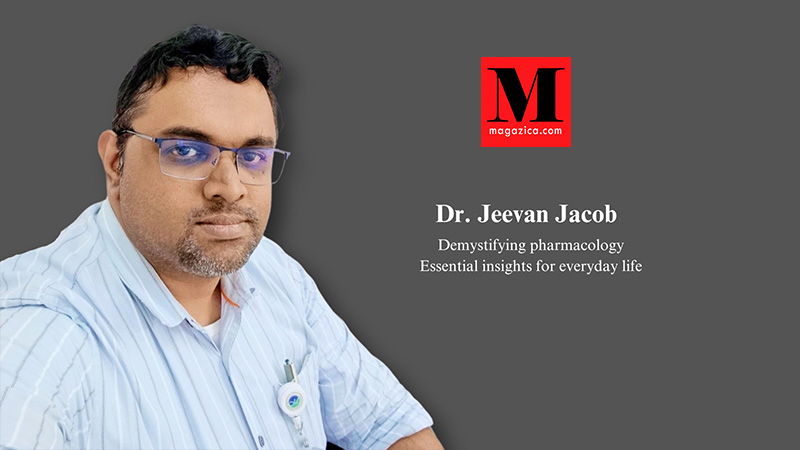Demystifying Pharmacology: Essential Insights for Everyday Life
- Home
- Demystifying Pharmacology: Essential Insights for Everyday Life

Demystifying Pharmacology: Essential Insights for Everyday Life
Magazica: Can you share a simple explanation of what pharmacology is and why it’s important for our health?
Dr. Jeevan Jacob: Pharmacology is the science of how drugs affect our bodies. It delves into what medications do, from fighting infections with antibiotics to lowering blood pressure with specific drugs. Understanding pharmacology is crucial for our health because it ensures doctors prescribe the right medicine at the correct dosage, minimizing side effects and maximizing the benefit. It also helps us, as patients, understand how medications work and make informed decisions about our treatment plans.
Magazica: How does your work in pharmacology help improve people’s lives on a daily basis?
Dr. Jeevan Jacob: My work in pharmacology contributes to better lives in a few key ways. Firstly, it helps ensure medications are safe and effective. By researching how drugs interact with the body, we can design treatments with minimal side effects and target specific illnesses more precisely. This translates to quicker recovery times and a better overall experience for patients. Secondly, my field is constantly innovating, leading to the development of new drugs to combat previously untreatable diseases. This offers hope and a chance at a healthier life for people struggling with chronic conditions. Finally, pharmacology helps educate both doctors and patients. By understanding how medications work, doctors can prescribe the most effective treatment, and patients can make informed decisions about their healthcare.
Magazica: What’s one common misconception about drugs and their effects on the body that you’d like to clarify for our readers?
Dr. Jeevan Jacob: One big misconception is that all medications work immediately. While some drugs, like pain relievers, offer quick relief, many others require consistent use over time to achieve their full effect. For instance, blood pressure medications or antidepressants need to be taken regularly to manage chronic conditions. Missing doses or stopping medication abruptly can actually worsen the condition or cause withdrawal symptoms. It’s crucial to remember, medications work by influencing complex biological processes, and achieving optimal results often takes time and consistent effort. Always follow your doctor’s instructions for the best outcome.
Magazica: Can you share a tip or strategy for anyone who’s trying to better understand their medications and how they work?
Dr. Jeevan Jacob: Absolutely! Here’s a tip for anyone wanting to understand their medications better: don’t hesitate to ask questions! Your pharmacist has a wealth of knowledge and can explain how your medication works, what side effects to watch out for, and potential interactions with other drugs or supplements you’re taking. Come prepared with a list of questions you have, and don’t be afraid to ask for clarification if something isn’t clear. Additionally, most medications come with a patient information leaflet. While it may seem technical, take some time to read through it for details about the medication’s purpose, dosage, and potential side effects. Remember, knowledge is power, and understanding your medications empowers you to take charge of your health.
Magazica: How do you approach teaching complex pharmacology concepts to students who are new to the field?
Dr. Jeevan Jacob: When introducing pharmacology to new students, I focus on making complex concepts relatable and engaging. First, I establish a strong foundation by connecting pharmacology to real-life experiences. For example, we might discuss how caffeine affects alertness or how aspirin reduces headaches. This helps students see the practical applications of the subject matter. Then, I break down complex mechanisms into smaller, easier-to-understand steps. This could involve using visual aids like diagrams or animations to illustrate how drugs interact with cells. Finally, I encourage active learning through interactive exercises, group discussions, and case studies. By making them analyze real-world scenarios, students can apply their knowledge and solidify their understanding of core pharmacological principles.

Magazica: What’s one piece of advice you often give to your students that could also be helpful for our readers?
Dr. Jeevan Jacob: One piece of advice I frequently share with my students – and it applies to everyone – is to be a curious and critical consumer of information about medications. Don’t hesitate to question what you hear or read online. Always consult reliable sources like government health websites, reputable medical journals, or your doctor before making any changes to your medication regimen. Remember, information online can be misleading or outdated. By prioritizing trustworthy sources and open communication with your healthcare providers, you can ensure you’re making informed decisions for your well-being.
Magazica: Can you share an example of a time when your mentoring made a significant difference in a student’s understanding of pharmacology?
Dr. Jeevan Jacob: I had a student, let’s name her Sarah, who initially struggled with pharmacology. She found the mechanisms of action and drug interactions overwhelming. To help, I started by connecting pharmacology to her passion for fitness. We discussed how certain supplements work to enhance athletic performance, sparking her interest. Then, we used analogies to break down complex concepts. For example, we compared drug receptors to lock-and-key systems, where the drug is the key, and the receptor is the lock. This visual helped her understand how drugs target specific molecules in the body. Finally, I encouraged her to participate in group case studies. Through active discussions, Sarah gained confidence in applying her knowledge to real-world scenarios. By the end of the semester, Sarah not only grasped the core principles but also expressed a newfound fascination with pharmacology, even considering research as a future career path. This experience highlighted the power of personalized mentoring and making the subject relatable to students’ interests.
Magazica: What’s one thing you wish more people knew about the science of drugs and their effects on the human body?
Dr. Jeevan Jacob: One thing I truly wish more people knew about drugs and their effects is that they are not a magic bullet. While medications can be incredibly powerful tools for treating and managing various conditions, they work within the complex machinery of the human body. This means their effectiveness can be influenced by a variety of factors, like individual genetics, lifestyle choices, and interactions with other medications or supplements. Understanding this complexity is crucial. It shouldn’t discourage people from seeking medical help or taking prescribed medications, but rather emphasize the importance of open communication with your doctor. By discussing your individual health and potential interactions, you can work together to develop the most effective treatment plan for your unique needs.
Magazica: How does understanding pharmacology contribute to a healthier lifestyle?
Dr. Jeevan Jacob: Understanding pharmacology empowers you to make informed decisions about your health. By knowing how medications work, you can participate actively in treatment discussions with your doctor, understand potential side effects and how to manage them, and avoid harmful interactions with other drugs or supplements. This knowledge empowers you to take charge of your medication regimen and, ultimately, contribute to a healthier and more informed approach to your overall well-being.
Magazica: Can you share a simple lifestyle change that, based on your understanding of pharmacology, could have a positive impact on our health?
Dr. Jeevan Jacob: From a pharmacology perspective, one simple yet powerful lifestyle change for improved health is getting enough quality sleep. Sleep is essential for numerous biological processes, including regulating hormones that impact metabolism and inflammation. When sleep-deprived, these hormones can become imbalanced, potentially increasing the risk of chronic conditions like heart disease and diabetes. Adequate sleep allows the body to repair itself and optimize its use of medications. So, aim for 7-8 hours of quality sleep each night – it’s a natural and free way to support your overall health and potentially minimize your reliance on medications in the long run.
- Share
Dr. Jeevan Jacob
A dedicated medical doctor and Assistant Professor of Pharmacology, shapes future medical professionals. His commitment to medical education is evident in his teaching at Dr. Moopens Medical College.
